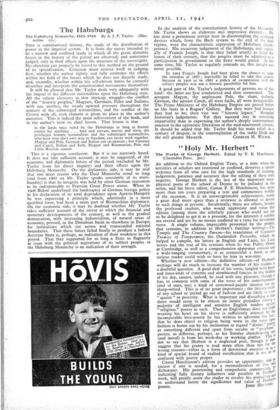"Holy Mr. Herbert
7 7
The Works of George Herbert. Edited by F. E. Hutchinson. (Clarendon Press. 30s.) AN addition to the Oxford English Texts, at a. time when the activities of scholars are restricted or confined, deserves a special welcome from all who care for the high standards of learning, judgement, patience and accuracy that the editing of these texts requires. George Herbert is the last of the important meta- physical poets of the school of Donne to be included in the series, and his latest editor, Canon F. E. Hutchinson, has spent more than ten years preparing a text and commentary worthy of the occasion. It is an unexceptionable achievement, worth a great deal more space than a reviewer is allowed to devote to such things at present. Incidentally, there are others, besides the professed student, who would appreciate and value this edition (among them the scholarly parson who could not fad to be delighted to get it as a presen$, for the interests it satisfies are several and.are by no means confined to a taste for devotional verse. A single volume, hnpeccably presented by the printer, that contains, in addition to Herbert's familiar writings—The Temple and The Country Parson—his translation of Cornaro's Treatise of Temperance, the. Outlandish Proverbs, which he helped to compile, his letters in English and Latin, his Latin verses and the text of his orations when he was Public Orator at Cambridge, as well as a comprehensive apparatus crnicul and a wide-ranging commentary, is as resourceful a book as any serious reader could wish to have by him in war-time. Whether-a new edition—the definitive edition—of Herbert's writings will do much to increase the number of his readers is a doubtful question. A good deal of his verse, tangled with knots and loose-ends of conceits and alembicated fancies in the fashion of his day, cannot, indeed, be read with any pleasure, though. it has, in common with some of the verse of his contemporaries (and of ours, too) a kind of crossword-puzzle interest for the sharp-witted. This is of no great importance ; the literary tricks of any school or period go out of fashion and are likely to seem " quaint " to posterity. What is important and disturbing is that there would seem to be almost an innate prejudice amon;, a majority of intelligent and sensitive English readers against " religious " Poetry as such. That an Englishman does not mind wearing his heart on his sleeve is sufficiently attested by the incomparable love-poetry he has written to advertise the fad, that he does object to religion being worn in the same oPen fashion is borne out by his inclination to regard "divine" Nett! as something different and apart from secular or " proPhane. poetry, as different, perhaps, as his 'Sunday church-going .sint (and mood) is from his week-day or working clothes. This Is Is /tot to say that Herbert is a neglected poet, though it does suggest that his poetry is read more often than not for the wrong reasons—either as a form of devotional exercise or as a kind of special brand of exalted versification that is not to be confused with poetry proper. Canon Hutchinson's edition provides an oppOrtunity, and. 3,11 excuse if one is needed, for a reconsideration of this dichotomy. His penetrating and sympathetic commentarY, indicating fully literary influences and parallels in 11.erben,' work, will greatly assist the reader, to resolve his prejudices to?. to understand better the significance and value of Herbert'






























 Previous page
Previous page